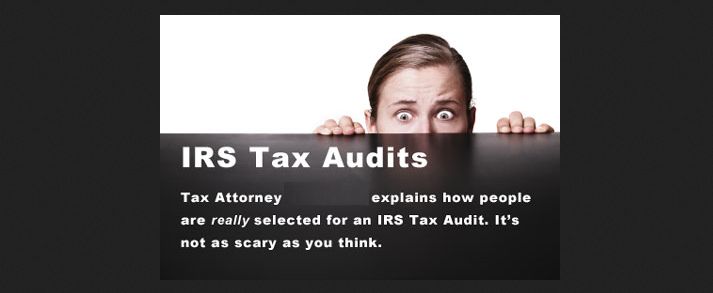How To Survive An IRS Tax Audit
We all dread having the IRS tell us it wants to reassess our previous year’s tax return. Let me start off by saying that if you’re being audited, you should probably look for help from a Tax professional. But if you’re the do-it-yourself kind, then there are certain things you can do to deal with the audit. I hope you find the tips helpful.
1. Keep your perspective clear and constant.
Almost no audits are the line-by-line examination of the return, which is what most people imagine when they think of an IRS probe. Often it is just a math error, or a mistake in the supporting documents.
Beyond that, sometimes a single aspect of a return will raise a red flag and the IRS will ask for additional supporting material. For instance, expert real-estate investors could claim losses & write-offs that casual investors may not have the capability to. But you have to meet certain criteria to be a professional rather than a run-of-the-mill investor. So, if a claim is made by an entrepreneur but the investment activity does not fall into the range that is normal for experts, the IRS may ask for more substantiation of that status.
2. Get help.
A certified public accountant, Larry Elkin, in Scarsdale, N.Y., mentions that when he’s audited, he never had to directly deal with the IRS. Hiring a CPA or tax attorney takes out the emotion from it. Experienced tax accountants and lawyers can identify when an issue is not as black-and-white as an agent might assert. There can be many shades of gray. Your audit can relate to a deduction that is controversial, where the IRS always attempts to take a stance that’s aggressive but where it has gone to court every time, it’s lost. The audit agent’ll write up points that claim a client owes money, he mentions. Often, we argue & win since they do not want a taxpayer to appeal the levy in court & win.
Also Read: [ When And Why Would You Need An IRS Tax Attorney? ]
3. Provide exactly what the agent asks for.
Resist the urge to volunteer information. It’s ideal to provide no less, but no more than the IRS requests. The perfect approach to receive an IRS audit over with faster is to have it kept confined to the single issue raised initially. If you talk to the audit agents directly, any tidbit of information that you’re offering can bring things to the attention of the auditor that he may not have otherwise thought of. That could open a new can of worms.
This is another reason in favor to have someone else represent you in an audit. If I had directly dealt with the agent, I may have invited an open-ended fishing expedition. The other way the agent had to decide what he wanted to know. He asked and we answered.
4. Don’t assume the IRS is right.
Agents can overlook important documents or make mathematical errors or as simply as a taxpayer could. And when financial values or laws are open to interpretation, the auditor’ll take the stance that gives the advantage to the IRS, the experts mentioned. That does not mean you cannot argue the opposite point of view successfully. If you’re donating a piece of art to a non-profit, nobody’s going to dispute that it is deductible, but you can be in disagreement over the deduction size.
In that case, it is up to you as a business owner to give documents, like appraisals or auction prices for similar items, in order to substantiate your claimed deduction. In case you could do so, the agent may have to be in agreement to a compromise number or accept it.
5. Decline requests in order to extend the IRS’s deadline.
Due to a backlog of cases, routinely, the IRS asks company owners that are audit targets in order to waive the statute of limitations typically restricting probes to the 3 previous years. Taxpayers have a few months to get their taxes together and the government has three years to audit them. That’s enough. You don’t have to endlessly accommodate them. The written request for tax relief might not read like a request and it might seem as if you have no other choice but to agree. Instead of being intimidated by the legalese, check with a tax adviser prior to responding.
Being stuck to a firm deadline with the IRS might not release you from an audit. The agent will complete as much as possible in the time allowed. If he’s right, you should pay the claim; if he’s not, you should dispute it. Either way, a proper response should bring the audit to a prompt close so that you can move on–and start getting ready for the next tax season.
8 Tips To Avoid Tax Audit
The IRS receives a great number of tax returns every year from individuals, married couples and businesses. Thinking about the sheer number of all the submitted applications you’d think that the chances of you being audited are slim. Well, in all honesty, you’re wrong. The IRS has been doing this for a while now, and they are rather good at what they do, they have a system in place that works somewhat like a filter. A filter that triggers an alert when certain items are spotted, basically stuff that is inaccurate or falsified. We all make mistakes, and it’s natural to mess up a couple of times on your IRS forms, but there are certain things that you should pay particular attention to, and make sure that they are accurate, so as to steer clear of an audit.
Also Read: [ IRS Offer in Compromise ]
1: Disproportionate Income Figures
You should know that the IRS has gone the extra mile to know what the average wage is for the job you have. And if your income figures do not tally with what other people in the same industry are making then the IRS will want to know why.
Best way to avoid this irs audit: Honesty is the best policy. Be honest with how much you really make or you will end up on the IRS radar every time you file returns.
2: Be careful with those Self-Employment Deductions
Being self-employed means you are allowed to work at home in your pajamas! But it also means that you are likely to be audited faster than others, which is mostly because you may claim deductions & business expenses that aren’t related to your self-employment.
Best way to avoid this tax audit: Don’t ever mix personal expenses & business deductions.
3: Keep track of those Tips and Cash Earners
It is hard to keep records of tips and cash payments that have to be reported on your tax forms. Therefore the professions that accept cash and tips will more frequently be audited by the IRS.
Best way to avoid this tax audit: The IRS agents tend to ask specific questions that will tell them when someone is hiding their true cash income. Answer truthfully and try to keep meticulous accounting records.
Also Read: [ What is a Back Tax? and How to Negotiate Back Taxes With IRS? ]
4: That sweet Home Office Deduction
The home office deduction is another red flag to the IRS because they have stringent guidelines on what qualifies as a home office. People like to include their entire home for the deduction.
Best way to avoid this audit: Your home office must be exclusively used for business purposes and not for other activities. Read IRS Publication 587 to confirm you qualify for the home office deduction, in accordance with the IRS.
5: Business Losses For Self-Employed or Sole Proprietor Tax Payers
Business losses for the first one or two years are common when you are self-employed or a sole proprietor. But if still, you’re claiming losses 3 years later after being in business for 5 years, the IRS’ll start to wonder if you really own a business or if you are just writing off a hobby to get more deductions, according to Learn Vest.
Best way to avoid this tax audit: Have all your business documentation so you can prove that you made a profit.
6: Making An Income of $200k or Higher
It is just a fact of life that the more money you make, the more likely you will be audited by the IRS. People will make more mistakes or underreport the amount they made on tricky tax returns when they are in much higher income brackets. Moreover, the IRS will get a higher payoff when auditing these tax returns.
Best way to avoid this tax audit: Ensure that you report all income and have the forms to back it up. Also, use the right tax forms and fill in all applicable fields.
7: Failing to Report All Taxable Income
It is easy to misplace a decimal point or add an extra number to throw off all your income figures. Yet if your tax returns don’t match the W-2 form or 1099 form sent to the IRS by your employer, the IRS will audit you, according to CBS News.
Best way to avoid this tax audit: If there is an error on your W-2 or 1099, have the employer send the IRS the corrected information.
Also Read: [ Form 2848 ] [ Form 1040 ]
8: Taking Higher-than-Average Deductions
It is easy to try to claim as many deductions as you can to get a bigger tax refund. But if the deductions are too large in comparison to the amount you earn (such as claiming $17,000 in expenses but only reporting $23,000 in gross income) an audit will happen.
Best way to avoid this audit: If you can claim the deduction and have the documents to back it up, then put it on the return. Don’t take a deduction that you can’t prove.


